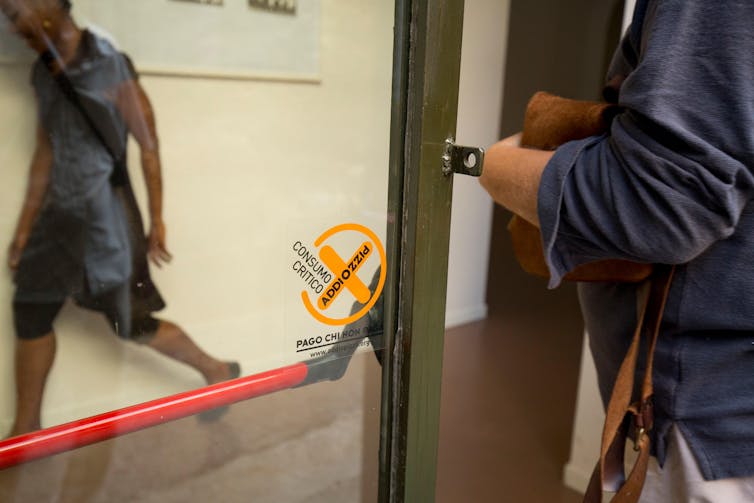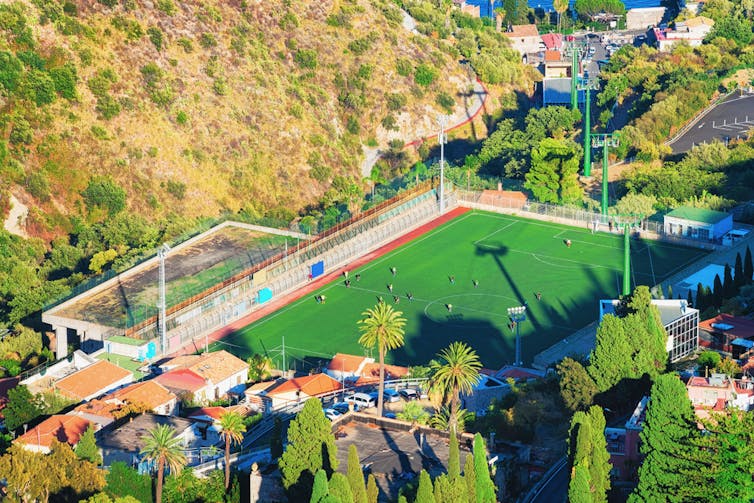The collective trauma that can result from bearing witness to the profound consequences of violence and injustice for an extended period can profoundly fracture communities. However, in the face of oppression, a resolute resistance will always emerge to confront it. One such example is the unyielding struggle that the Sicilians have fought against the mafia.
Many Sicilians have refused to remain mute, despite the mafia’s violent methods and sinister political alliances, despite the overwhelming force they face. Sicilians began to challenge and resist the mafia’s oppressive authority as early as the 1870s, according to archival records.
Resistance has escalated over the past three decades. Sicilians publicly honor the victims of the mafia. Activists and businesses collaboratively promote anti-racketeering efforts, such as refusing to pay extortion payments and displaying stickers on their premises to overtly signal that they refuse to pay.

Alamy
The objective is to establish novel social norms that challenge the mafia’s intimidation and code of silence. This entails the development of a community ethos that prioritizes refusing to pay extortion (pizzo) and speaking out against mafia intimidation as the expected behavior, rather than compliance.
These emerging social norms empower individuals and businesses to challenge and undermine the mafia’s control by resisting the traditional passivity toward mafia demands. In order to counteract the mafia’s strategies, this conflict must be dynamic and evolve continuously.
The study of the development of social norms in societies that have experienced trauma is a relatively new field. Through my long-term observational research conducted over a decade in Sicily, I have sought to understand how historical injustices influence collective resistance and, ultimately, shape the social norms required for victory.
For instance, I have discovered that informal rituals, such as commemorating the anniversaries of victims’ deaths with memorials or public gatherings, assist communities in contextualizing past events by reinterpreting them as valuable teachings. Those who have lost loved ones demonstrate how these acts become educational by commemorating mafia victims and sharing their tales, thereby teaching the community about resilience and resistance against the mafia.
Local activist organizations are instrumental in revealing the corrupt alliances between political figures and the mafia. They frequently organize public discussions and exhibitions that focus on specific instances in which politicians have collaborated with the underworld. These events not only serve to educate but also to secure community support for political accountability.
During their commemorations, activists openly allocate blame, frequently emphasizing instances in which the state failed to protect its citizens or disregarded the mafia’s influence over local communities.
Ritual is transformed into authority.
The message that the mafia’s code of silence must be broken is reinforced by the repetition of rituals of this nature over protracted periods. Antonia, one of the individuals I interviewed, stated:
Each commemoration is more than remembering the innocent people killed by the mafia, but a resilience explaining that we will not be silenced against those injustices, and we will hold the state, politicians, and all other actors who have cooperated with the mafia accountable because we believe that this type of information is another form of power.
By appealing to the emotions of citizens and mobilizing them toward collective resistance, other rituals serve as catalysts for community-wide action. The objective is to inculcate behaviors that discourage participation in mafia activities and transmit social norms to the next generation.
For instance, the value of fair play and rules is instilled in young individuals through the encouragement of participation in organized sports, which in turn fosters an understanding of the rule of law. They also develop a sense of discipline and integrity, which are crucial in resisting the allure of mafia involvement.

Additionally, organizations form to provide free legal assistance to people who are the target of mafia extortion for pizzo payments. This is done in order to disrupt the long-standing tradition of paying to avoid trouble.
Serenella, a local business proprietor from Palermo, underscored the significance of resources in the successful pursuit of a war against the mafia during our interview:
Collective solidarity and the development of a strong Palermitan identity based on antimafia values are critical factors in reducing the mafia’s power among future generations. We need more state resources to change people’s behaviours by investing in education, infrastructure, and ensuring a healthy future for young people. We do not want to be abandoned by the state again, as previous generations were.
Serenella’s point is crucial in the development of a culture of lawfulness.
The Sicilian experience serves as a poignant reminder of the difficult task that communities encounter when they have endured protracted injustice at the hands of powerful entities. For an extended period, politicians have collaborated with oppressors at the expense of their own constituents.
In Sicily, change has been gradual, despite the fact that there have been over 150 years of antimafia resistance. The mafia has established itself as a dominant force in Sicily’s social and political landscape as a result of corrupt state institutions and legislators, as well as the abandonment of Sicilian citizens to their own fate. Nevertheless, the transformation of social norms is a protracted process that many communities anticipate will ultimately result in their liberation from the mafia’s influence.
